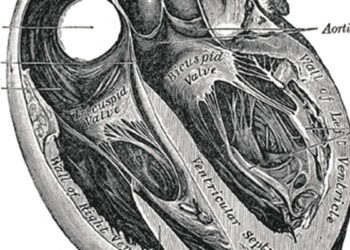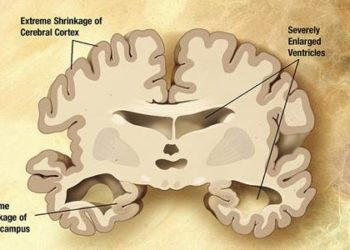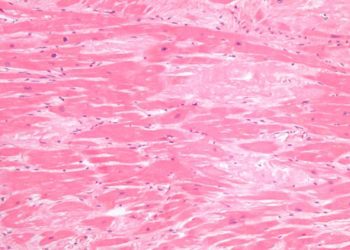Patisiran is effective in treatment of hereditary transthyretin amyloidosis.
1. Patisiran, an RNA interference agent, improved neuropathy symptoms and motor function in patients with hereditary transthyretin amyloidosis after 18 months of use.
2. Types and rates of adverse events were similar in the treatment and placebo groups.
Evidence Rating Level: 1 (Excellent)
Study Rundown: Hereditary transthyretin amyloidosis (HTA) is a systemic, autosomal dominant disorder that involves accumulation of mutated transthyretin in various organs. Manifestations of the disease include cardiomyopathy, progressive kidney dysfunction, and polyneuropathy. Treatment options, including liver transplantation, are limited and often do not adequately control the disease. RNA interference (RNAi) holds promise as a treatment modality to reduce circulating dysfunctional transthyretin. The APOLLO trial investigated the use of patisiran, an RNAi agent targeting transthyretin production in the liver, to assess its effect on the primary end-point of change in neuropathy from baseline after 18 months in patients with HTA. This phase 3 randomized controlled trial found that patients randomized to patisiran had a significantly improved reduction in progression of neuropathy symptoms. Secondary outcomes were also improved with patisiran treatment, including quality of life, gait speed, motor strength, and heart structure. Adverse events were similar in both groups. These results are consistent with a clinically and statistically significant benefit of patisiran in treatment of HTA.
The randomized, double-blind, placebo-controlled study design of the APOLLO trial provides the highest level of statistical evidence supporting drug efficacy. The trial exceeded its target recruitment goals, and is therefore likely to be well-powered. Limitations include an inability to determine a mortality benefit of the drug, and exclusion of patients with significant liver or kidney disease.
Click to read the study in NEJM
Relevant Reading: Evolving landscape in the management of transthyretin amyloidosis
In-Depth [randomized controlled trial]: This was a phase 3, multicenter randomized controlled trial that enrolled 225 patients to either placebo (n=77) or patisiran (n=148). Key trial inclusion criteria were a diagnosis of HTA with a concomitant pathogenic variant in the transthyretin gene, Neuropathy Impairment Score of 5 to 130, and adequate liver and renal function. The primary outcome was change from baseline to 18 months in the modified Neuropathy Impairment Score+7. Key secondary outcomes included scores on a quality of life questionnaire, motor strength, overall disability, gait speed on a 10-m walk test, and score on a composite scale of autonomic symptoms. Several biomarkers of treatment response were investigated, including circulating transthyretin, N-terminal pro-brain natriuretic peptide (NT-proBNP), and echocardiographic measures of cardiac structure.
Within three months, participants treated with patisiran had a significant decline in serum transthyretin levels that was sustained for the duration of the study. After 18 months of follow-up, the mean change in the primary outcome was significantly lower in the treatment arm relative to placebo arm (mean difference ± SD: Patisiran 80.9 ± 41.5, Placebo 74.6 ± 37, Difference in least-squares mean between arms, -34.0; P<0.001). Decline in quality of life was attenuated with patisiran (P<0.001). The difference in change in gait speed at follow-up was 0.31 meters/second (P<0.001). Analysis of changes in NT-proBNP favored patisiran over placebo, as did changes in left ventricular wall thickness and left ventricular longitudinal strain.
Image: PD
©2018 2 Minute Medicine, Inc. All rights reserved. No works may be reproduced without expressed written consent from 2 Minute Medicine, Inc. Inquire about licensing here. No article should be construed as medical advice and is not intended as such by the authors or by 2 Minute Medicine, Inc.







